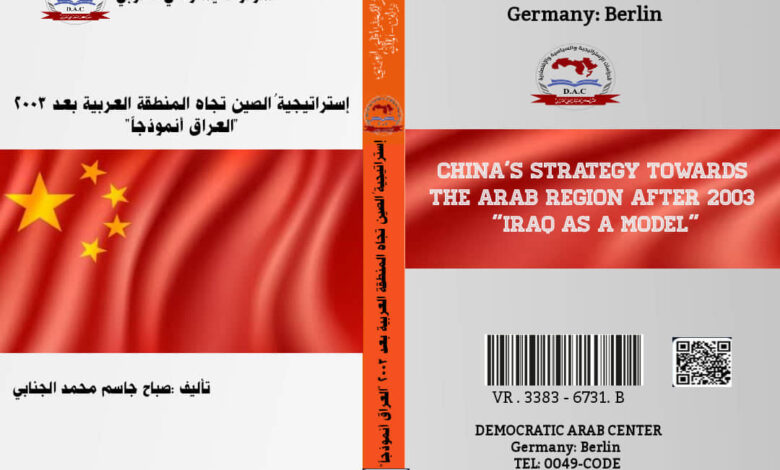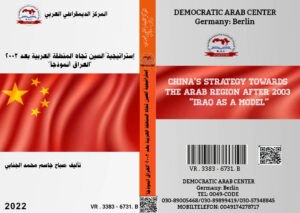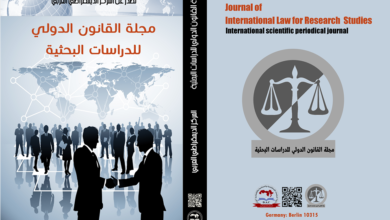إستراتيجيةُ الصين تجاه المنطقة العربية بعد 2003 العراق أنموذجاً
China's strategy towards the Arab region after 2003 Iraq as a model

تأليف : صباح جاسم محمد الجنابي – مستشار/ وزارة خارجية جمهورية العراق الممثلية الدائمة لجمهورية العراق في جنيف
نسخة “pdf”-
إستراتيجيةُ الصين تجاه المنطقة العربية بعد 2003 العراق أنموذجاً
الطبعة الأولى “2022″ –من كتاب: – إستراتيجيةُ الصين تجاه المنطقة العربية بعد 2003 العراق أنموذجاً
جميع حقوق الطبع محفوظة #المركز_الديمقراطي_العربي ولا يسمح بإعادة إصدار هذا الكتاب أو اي جزء منه أو تخزينه في نطاق إستعادة المعلومات أو نقله بأي شكل من الأشكال، دون إذن مسبق خطي من الناشر .
تقديم :
يسلط البحث الضوء على إستراتيجية الصين تجاه المنطقة العربية نظراً لما تمتلكهُ هذهِ المنطقة من أهمية جيوإستراتيجية واقتصادية بوصفها مصدراً رئيساً للنفط والغاز والثروات الطبيعية الأخرى التي تعتمد عليها الصين في نهضتها الاقتصادية، لذا تنتهج الصين سلوك تجاه المنطقة العربية يهدف إلى تعزيز وضمان ومواكبة نموها الاقتصادي المتصاعد عن طريق سياسة القوة الناعمة، انطلاقاً من الرابط التاريخي الذي يتجلى بطريق الحرير بصيغته القديمة والجديدة وذلك لربط الصين مع عدداً من الدول العربية، ان اختيار العراق كنموذج جاء ليوضح طبيعة السلوك الخارجي الصيني تجاهه عبر مختلف أبعاده التاريخية والسياسية والاقتصادية والثقافية في ظل المنافسة بين الصين والقوى الكبرى الأخرى وفي مقدمتها الولايات المتحدة الأمريكية لبسط هيمنتها على المنطقة العربية.
لقد حققت العلاقات العراقية- الصينية انجازات عديدة على الصعد كافة منذ تاريخ تأسيس العلاقات الدبلوماسية بين البلدين عام 1958، إلا ان تلك العلاقات دخلت مرحلة تاريخية جديدة منذ عام 2003 نتيجة للتغير الكبير الذي شهدتهُ المنطقة العربية إذ تسببت الحرب التي قادتها الولايات المتحدة الأمريكية ضد العراق وإسقاط نظام (صدام حسين) إلى تحول التواجد الأمريكي إلى تواجد دائم؛ وبالمقابل فقد سعت الصين إلى ضمان تواجد لها في المنطقة العربية من خلال انتهاج جملة من الأدوات والوسائل والتي من بينها تأسيس علاقات تعاون استراتيجي شامل مع الدول العربية وإنشاء منتدى التعاون العربي- الصيني عام 2004، وقد ساهمت هذهِ الوسائل بتطور العلاقات العربية- الصينة لتشهد تعاوناً استراتيجياً ولا سيما مع توافر فرصة تاريخية ممكن ان تسمح للمنتدى ان يرتفع إلى مستوى منظمة رسمية مثل منظمة شنغهاي للتعاون (SCO)، كما ان تأييد الطرفين العربي والصيني لمبدأ تعدد الأقطاب وعدم التدخل في الشؤون الداخلية لبعضهم البعض قد ساهم أيضاً في تعزيز التقارب والتواصل بينهما.
Abstract
The research entitles China’s strategy toward the Arab region in 2003, “Iraq as a model” focusing on China’s strategy toward the Arab region in general and Iraq in particular due to its geostrategic and economic importance as a major source of oil, gas, and other natural resources on which China depends in its economic renaissance, so China adopts a behavior aimed at strengthening and ensuring the energy sources required for its escalating economic growth by adopting a soft power policy based on the historical link that is manifested in the old and new Silk Road in order to link China with a number of Arab countries.
The choice of Iraq as a model came to clarify the nature of the Chinese external behavior towards it through its various historical, political, economic, and cultural dimensions in light of the competition between China and other major powers, especially the United States of America, to extend its existence in Iraq, once the Iraqi-Chinese relations have achieved many achievements at all levels since its establishment between The two countries in 1958, however, these relations witnessed remarkable progress, especially after the conditions that the world witnessed due to the war led by the United States of America and its allies against Iraq, which led to the overthrow of Saddam Hussein’s regime and the transformation of the American in Iraq presence into a permanent presence, this new situation encourages China seeks to ensure a strategic presence in Iraq in conjunction with Iraq’s tendency to open up to the world. China is well aware of Iraq’s size, strength, and rising regional and international standing, as well as its large and sustainable economic capacity in the field of energy supply in the medium and long term. Therefore, the strategic interests of the two countries require expanding the horizons of cooperation in order to achieve Mutual strategic goals, what supports China’s strategy towards Iraq after 2003 are its stated positions by supporting the Iraqi new political system and emphasizing the need to respect the independence, sovereignty and territorial integrity of Iraq, and from an economic point of view, China has become Iraq’s largest trading partner.
China recognizes Iraq’s size, strength, and rising regional and international standing, as well as its large and sustainable economic capacity in the field of energy supply in the medium and long term. Therefore, the strategic interests of the two countries require expanding the horizons of cooperation in order to achieve mutual strategic goals.
The establishment of the Arab-Chinese Cooperation Forum in 2004 and China’s ambition to rise it to a level of an organization in light of the consensus of the Chinese and Arab viewpoints and their support for the principle of multipolarity, as well as the establishment of comprehensive strategic cooperation relations with most Arab countries, including Iraq in 2015, are among the tools that China pursued it in its strategy towards Iraq and the Arab region.
The research contains three chapters, besides the introduction and epilog and the conclusion as the following:
- The first chapter focuses on the Chinese strategy-making institutions and their objectives toward the Arab region, divided into two sections the first one interested the Chinese strategy-making institutions, while the second chapter concentrates on the role of these objectives of these towards the Arab region.
- The second chapter entitled “The Nature of Chinese Strategy towards the Arab Region and Mechanisms for Dealing” is divided into two sections the first one interested in the nature of Chinese strategy in the Arab region, and the second chapter concentrates on the mechanisms for implementing the Chinese strategy towards the Arab region.
- The third chapter that deals with the basic aspects of the Chinese strategy towards Iraq after 2003 and its future prospects are divided into two sections, the 1st one basic aspects of the Chinese strategy towards Iraq, and the second section deals with the future prospects of the Chinese strategy towards Iraq.
Finally, the study of the most important findings and recommendations reached by the researcher, the researcher has tried to present this study in an objective scientific way hoping to know the goals and benefits of China’s strategy toward Iraq and the Arab region.
- الناشر: المركز الديمقراطي العربي للدراسات الإستراتيجية والسياسية والاقتصادية





